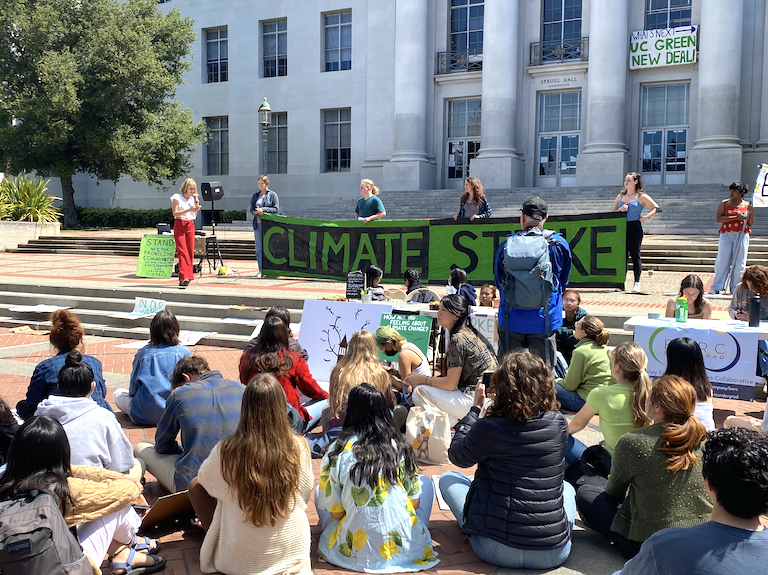
Student Activism at UC Berkeley, Then and Now
UC Berkeley has become famous as one of the most liberal universities in the United States. I personally was drawn to Cal because of the school’s profound emphasis on social justice amongst the student body and faculty. This is beautifully exemplified every year by student-run events for Earth Day: featuring a week of climate change and environmental policy activities on and off campus, including fundraisers, club recruitment, and informational guides on conservation and sustainability. In so many ways, Berkeley students are an epicenter of climate justice. The students of today build on a long history of activism and advocacy that are foundational to both the city and university of Berkeley. Below I provide a brief background on Berkeley’s activism history, as well as introduce some current UC Berkeley students making waves in the climate action space!
Berkeley: A History of Activism
From the mass protest of the Vietnam War to the Civil Rights Movement, Cal has been shaped by the voices of its student body. One of the most famous student advocates in UC Berkeley’s history was Mario Savio, a philosophy student and a key leader of the Berkeley Free Speech Movement (FSM), which emerged with the rise of political activism in the 1960s.
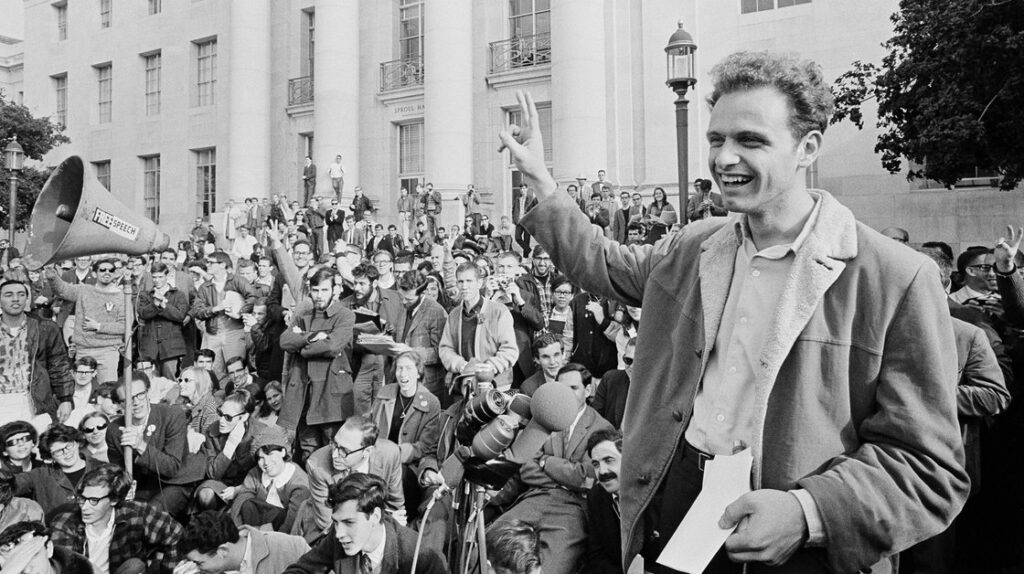 Mario Savio and students at Victory Rally on Sproul Plaza. December 1964. Berkeley Historical Plaque Project.
Mario Savio and students at Victory Rally on Sproul Plaza. December 1964. Berkeley Historical Plaque Project.
During the 1950s, several universities, including Berkeley, had enacted a ban on student groups taking part in any on- or off-campus political activities. Liberal administrators at the school had overlooked off-campus activities, but as hundreds of students were arrested at outside protests, political pressures led Berkeley administrators to order that students could no longer carry out such activism near the campus. The students refused to be silenced and continued publicly protesting, gathering 5,000 protestors on December 2, 1964 at the Victory Rally. 1,500 people peacefully sat in protest in Sproul Hall as Savio gave his infamous Sproul Hall Sit-in Address, “you’ve got to put your bodies upon the gears and upon the wheels, upon the levers, upon all the apparatus, and you’ve got to make it stop… unless you’re free, the machine will be prevented from working at all.” Faculty witnessed the event and supported the FSM, and soon after the university shifted policies with a new chancellor who supported the students. The Free Speech Movement ultimately escalated and inspired numerous campuses to assume a similar course of action. This spirit has never dwindled, inspiring countless students even today, myself included.
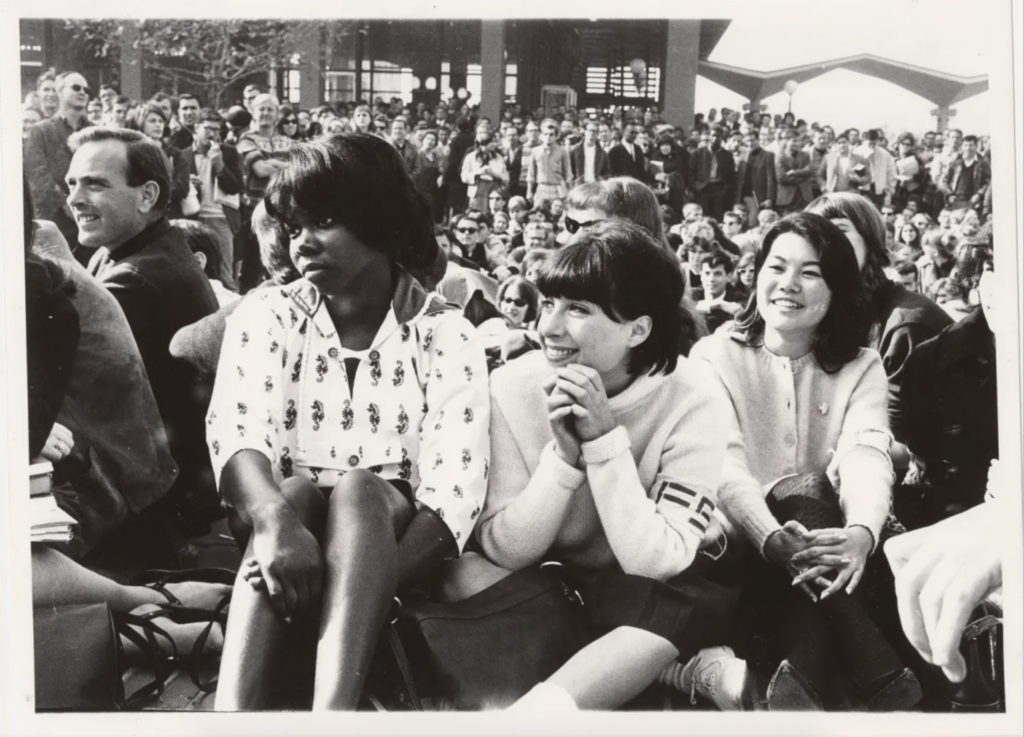 View of students seated in Sproul Plaza. November 1964. UC Berkeley, University Archives.
View of students seated in Sproul Plaza. November 1964. UC Berkeley, University Archives.
Meet Student Groups at the Climate Strike
During Earth Week, I personally attended the Green New Deal Climate Strike, which raised awareness regarding the need for the university to implement environmental policies, as well as urging the student body to sign the petition for the Green New Deal, which would allow the Berkeley campus to enact more than a hundred sustainable policies to reduce carbon emissions and waste. This was one of several large-scale student run events in the name of progress and school betterment. Hundreds of students attended to voice their support for the cause, bringing the community together all with similar interests of environmental activism.
Energy and Resource Alternatives
Most student groups at the event were part of Berkeley’s Energy and Resources Collaborative (BERC), a program that connects students with faculty, nonprofit and government organizations, alumni, and industry leaders to find solutions for viable energy alternatives. I was lucky enough to have the opportunity to interview a few organizations that were represented at the demonstration. From Berkeley Student Farms to the Berkeley Student Food Collective, Defend People’s Park to the Surfrider Foundation, all organizations passionately emphasized the sense of community that these clubs and events like the Climate Strike have brought to their student experience while at Berkeley.
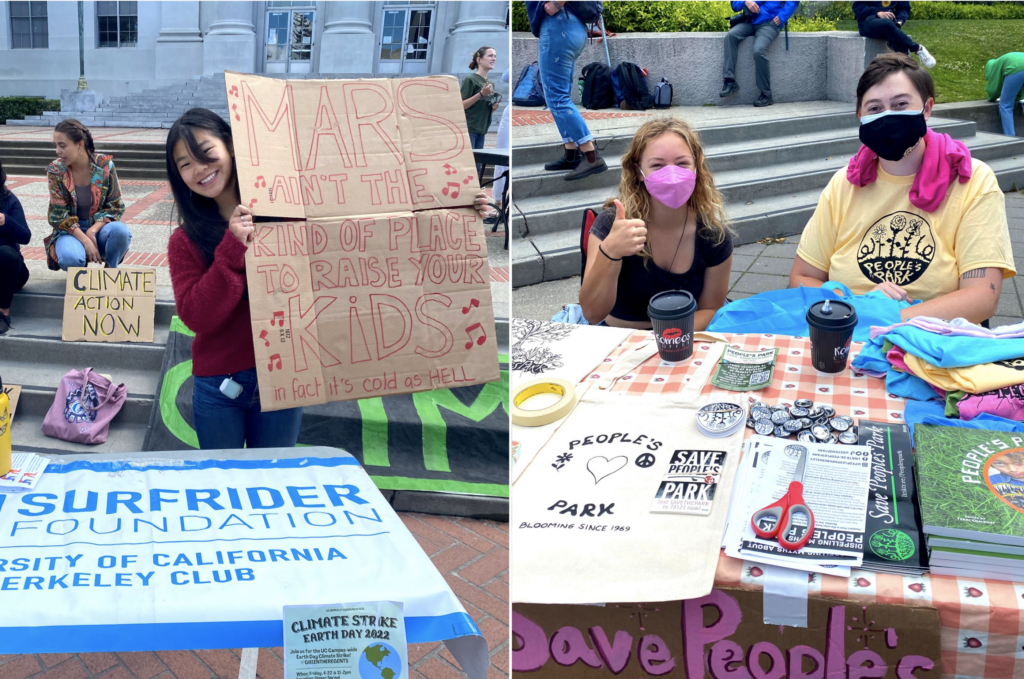 Surfrider Foundation (left), Defend People’s Park (right)
Surfrider Foundation (left), Defend People’s Park (right)
Considering Sustainability and Natural Fuels
Grant Mills, a senior nuclear engineer, tabled in favor of nuclear energy as a means of combating the university’s abundant use of fossil fuels. Since his very first chemistry class, he knew that nuclear engineering was his calling and Berkeley was the perfect environment to further that passion. Mills found that although the school and much of the student body doesn’t necessarily agree with the switch to this renewable energy source, he does find that the campus has been incredibly supportive of his work, particularly the Office of Sustainability. Similarly, the Biofuels Technology Club (BTC) works to implement biodiesel using the food waste from one of the university’s cafeterias, Crossroads, as a fuel alternative. This sustainability club is an opportunity for both STEM and non-STEM students who are interested in biodegradable energy. Students Ashley Chu and Caroline Chrisophersen also represented the organization and reflected that BTC was “great for meeting like-minded students on campus” since their freshman year.
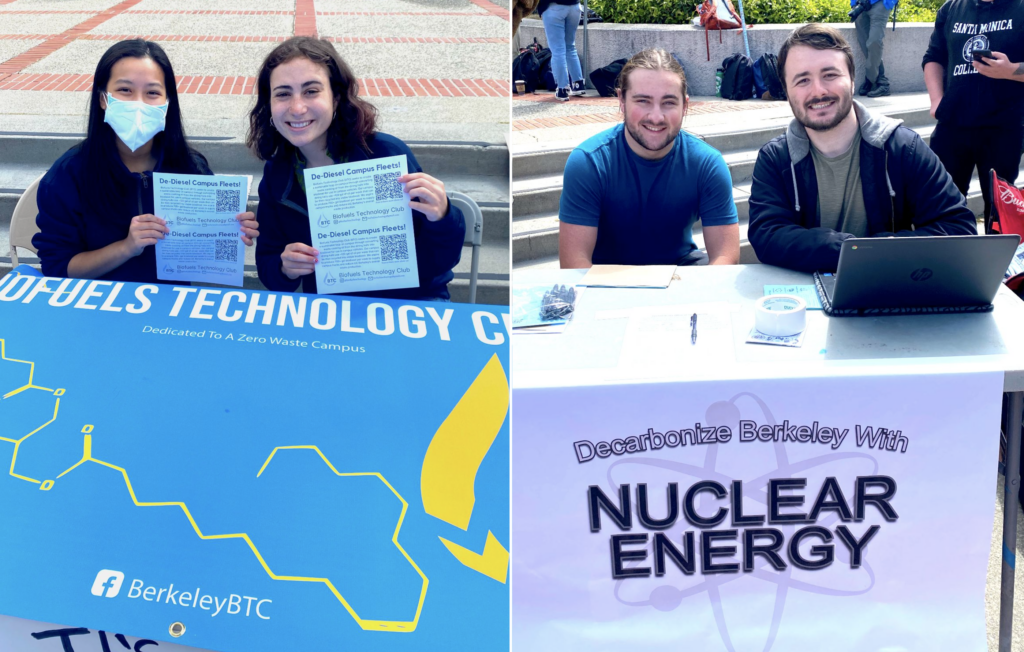 Left: Ashley (left) and Caroline (right) tabling for Biofuels Technology Club (BTC); right: Grant Mills (right) tabling for nuclear energy as a fossil fuels alternative
Left: Ashley (left) and Caroline (right) tabling for Biofuels Technology Club (BTC); right: Grant Mills (right) tabling for nuclear energy as a fossil fuels alternative
Seeking: Environment Loving Students
The Global Environment Theme House (GETH) also tabled at the strike to both show their support and attract students to their program. GETH provides a small community experience within the larger University and attracts students who are committed to protecting the environment. GETH residents, also known as GETHies, will learn about green living and giving back to our environment, grow as leaders, and develop friendships. Participants live together on the Clark Kerr Campus and take seminars, have weekly meetings, attend Fall and Spring retreats, and participate in community service projects. Students Cat Osbourne and Anna Locas praised GETH for the opportunity to “live with like-minded students who all care about the environment deeply,” echoing the program’s purpose of prioritizing the experience and passion of students.
Building Community Through Advocacy
Luna Hohner, one of the founders and speakers of the strike, is a sophomore who leads the Environmental Council on campus. Hohner believes the Green New Deal “offers a just transition to a more equitable future for everyone… for collective action UC wide,” and “wants people to feel inspired and excited about what is happening, but to also put pressure on the university because there is so much we can do.” The purpose behind the strike was not only to take environmental action, but also to “come together as a community… with all the momentum of everything happening” with Earth Day events. Hohner was one of many students actively leading others through the activities available at the strike, including petition signing, poster making, and organization recruiting, while also consistently delivering speeches and policy information over the course of the day.
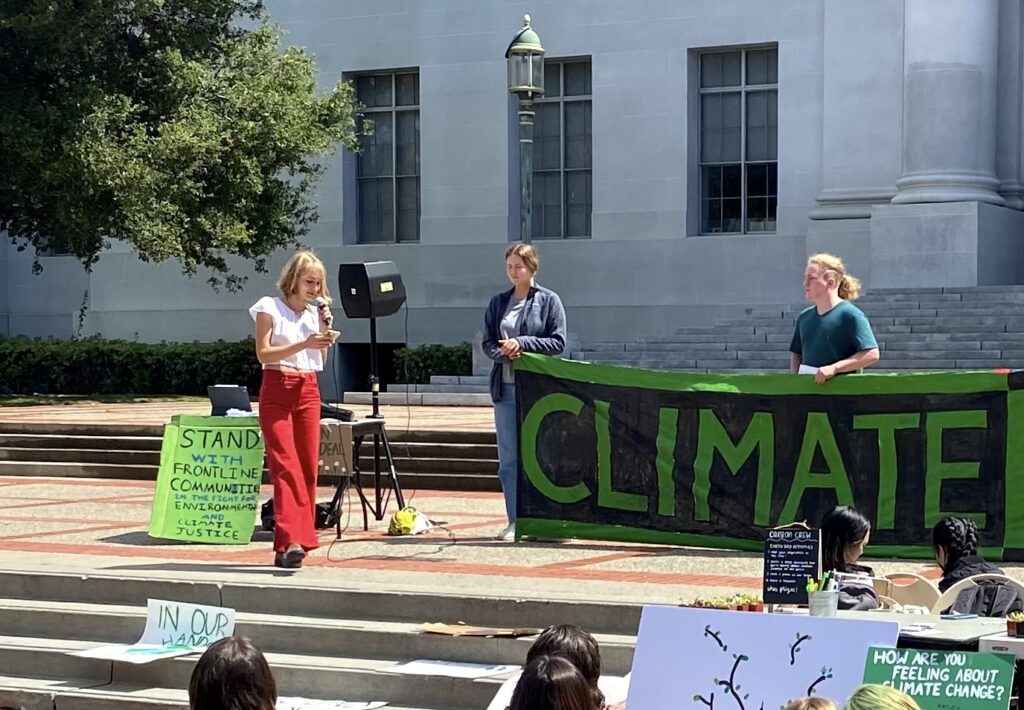 Luna Hohner speaking at the Green New Deal Climate Strike.
Luna Hohner speaking at the Green New Deal Climate Strike.
I found the Climate Strike to be a perfect example of UC Berkeley’s student culture through activism. From the Free Speech Movement to today, students will continue “to fight for what we believe is right,” as Hohner eloquently stated in her speech, addressing the students, university, and community alike. Political activism has been and will continue to be instrumental in student experiences here at Cal, as students continue to amplify their voices for a better future.
Kelsey McIvor (Class of 2024) wrote this article as a rising junior with Global Studies and Spanish major with intended minors in Education and Journalism. All non-archive photos by Kelsey McIvor.